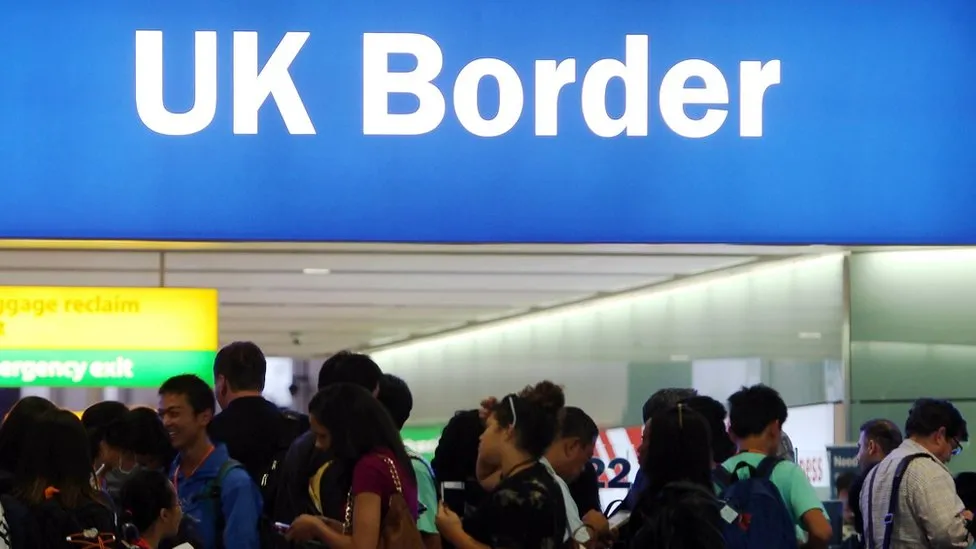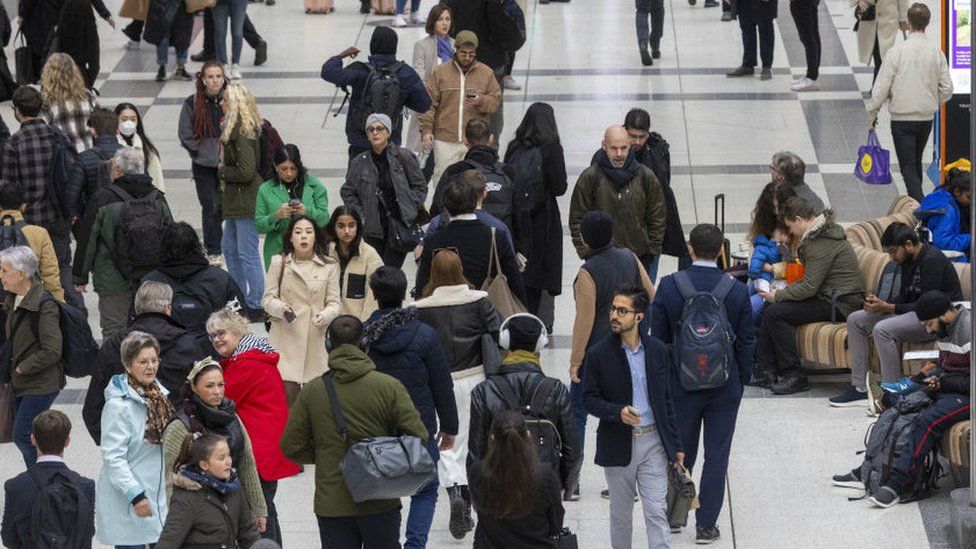
Will curbs to migration hit the UK economy?
The UK government has unveiled measures that it says will lead to the biggest ever cut in net migration.
Home Secretary James Cleverly has said the five-point plan announced will mean 300,000 people who were eligible to come to the UK last year would not be able to in the future.
But what impact will these curbs have on the economy?
A lower number of workers normally holds back the overall size of an economy, but when that measure is adjusted on a per person basis the evidence is more mixed.
It is clear, however, that in certain sectors, the impact can be profound.
Such a balancing act clearly weighed on the government’s thinking with the plan outlined this week. They chose not to impose a “hard cap” on numbers, after which visas simply run out for any purpose.
Social care workers, the cause of the overwhelming increase in work visas granted in the past two years, were exempted from the main policy move in the plan, to increase the salary threshold from £26,200 to £38,700. This will cushion the economic effect in a sector already in a parlous state.
Overall if there were 300,000 fewer workers per year, that would be significant, representing just under 1% of the workforce. The bigger picture here is that the overall size of the UK workforce is expected to decline in the coming years, with widespread impacts for tax revenues, borrowing, and support for pensions.
The basic demographics of this are that in 2010 there were three workers for every one pensioner in Britain. Over the next couple of decades that will fall to two. That is a profound shift for a tax system that relies on workers’ wages to pay the pensions of retirees. The 1901 census pointed to 10 workers for every pensioner.

However, mass migration (and it is difficult to describe a number above 500,000 a year as anything else) does obviously cause immediate pressures on spending in health and education, and if workers remain in the UK, can add to long-term costs of an ageing society.
So the 300,000 “cut” to the increase in net migration announced by the government is mostly focused on dependants, both of workers and students.
This should lessen the overall economic impact. But it is unclear how much it will reduce the incentive for care workers or certain types of student to come to the UK.
In the past year the pattern of dependants coming to the UK has been 86,789 from India, 47,795 from Nigeria and 22,235 from Zimbabwe.
This leads to quite an important bigger picture in terms of the post-Brexit points-based visa regime.
Every single one of the hundreds of thousands of extra migrants were given a visa to do so by the government. “Taking back control” of immigration policy has meant that Westminster can now control European worker numbers, which were theoretically unlimited under “freedom of movement”.
There is net emigration of EU workers now. But the experience of the past two years is that has been replaced by even more non-EU migrants.
Some experts argue that is a structural feature of having stopped freedom of movement. Younger workers from Europe with no interest in staying in the UK, could easily come and go, to work in the care sector, filling vacancies.
Now, in order to attract care workers from much further afield, from Nigeria, India, Zimbabwe, Ghana and Bangladesh, the government chose to offer the chance to bring their families.
Likewise, in order to help universities attract students paying fat fees (essentially to replace taxpayer subsidies for domestic students), the government created a graduate route to stay in the UK for two years. Some 43% of its use was from Indian students.

These are balancing acts. Charities such as Age UK say that the social care system was “saved” from collapse by tens of thousands of non-EU workers. The surge in foreign students, not just subsidises young Britons, but is also an export industry which creates growth in every large and small city in the UK.
Eventually, some of the workforce issues could be solved by training up British workers, or reintegrating some of the economically inactive. This has been a stated political priority of different governments for a decade and a half. It has not happened, and the situation has worsened since the pandemic.
Could it be that a constant flow of cheaper foreign workers has reduced the incentive for the care sector, for example, to recruit from within? That is certainly a factor, but the government itself basically acknowledged the care system is dependent on foreign carers in 2021, and reaffirmed that this week.
There are many other factors. The NHS workforce plan, for example, is far from fully funded, and could cost £50bn a year according to the Institute for Fiscal Studies. Councils would need billions more to pay likely higher wages in the sector.
So there is no straight economic answer to whether significant cuts to net migration will hamper British growth.
The government appears to have tried to refocus its points-based system on those with the most immediate economic benefit.
But the long-term promise of British politicians to make the UK economy less dependent on foreign workers has not yet materialised.